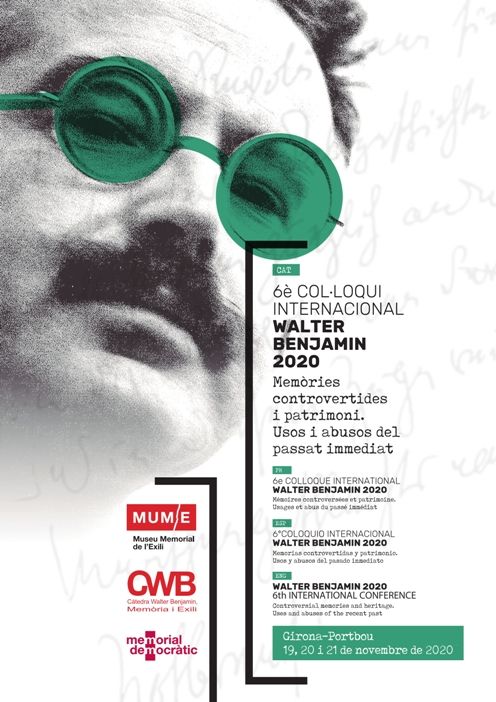- The 6th Internacional Conference Walter Benjamin will be held online from November 19 to 21;
- The conference aims to address the tension between the rigorous transmission of historical knowledge and the heritagization trends that sometimes stray into commercializing the past;
- Meanwhile, it seeks to generate reflection on the controversies generated by what we might generally refer to as “totalitarian monument heritage”.
The past seems omnipresent to us and is contained in the present in such a way that it has, occasionally, become a resource used in a wide variety of manners. These uses are so manifold that the fostering of a thorough knowledge of what has gone before us has frequently become an exception, neglected while commercialization, superficiality and trivialization have taken over. Everywhere one looks, especially in the area of heritage management, there are recreations that aim to achieve the impossible goal of reproducing the past as it occurred. Moreover, we have witnessed a proliferation of literary creations, films and television series for which the past has been a great source of inspiration. Meanwhile, an ever-growing number of video games, theme park attractions, or fun leisure activities such as escape rooms have created that base their storylines on historical events or characters. This industrialization of the treatment of the past has led to distortion and a lack of rigour. The issue is compounded when the past that one aims to restore or exploit for the purposes of tourism is related to events of a traumatic nature; that is, past events that remain unresolved in the collective memory, such as relatively recent armed conflicts, genocides, dictatorships, dirty wars and political violence.

A tool for approaching the past in this way is heritagization. One of the questions that may be posed is whether these conservation options should have ethical boundaries. What are the acceptable mechanisms of heritagization when it comes to dealing with relatively recent traumatic events? The term “memory industry” has frequently been employed to criticise what is considered a disrespectful approach to the past. Trivialization, simplification and cultural or political Manicheanism are some of the terms used when the visions of the past that end up gaining social traction are far removed from supposedly scientific historiographical accuracy and intellectual honesty. However, we must also ask who should guarantee this accurate transmission and dissemination of readings of the past. Public policies on historical memory can undoubtedly play a crucial role. They could constitute the foundation on which to build what is referred to in the English-speaking world as “public history”; that is, to ensure that content generated in the field of specialized historiography reaches the general public. As such, it is obvious that in order to provide this access, it is essential to foster and disseminate this content in a way that adapts to heritagization techniques and cultural tourism circuits.
Therefore, when it comes to memory, especially recent memory, one may argue that controversy is almost implicit. In this respect, clashing political positions, opposing views on heritagization, or even commercial and tourism-related expectations, invariably involve heated debates. Further complications may arise when, in public space, traces remain of previous undemocratic political regimes. Statues related to slavery and colonialism, symbology and monument sites related to Nazi, fascist (or Francoist) ideology, along with Stalinist imagery, are some of the best-known examples. How to deal with this legacy is one of the main issues that this conference aims to address: eradication, resignifying, trivialization, indifference, abandonment and oblivion are frequently used terms in relation to this matter.
Thursday, 19 November
Opening session
18.00 h Gemma Domènech, General Director of Democratic Memory
Keynote speeches
18.00 h Antonio Cazorla
“Europe and the controversial heritage”
18.30 h Ludmila Catela Da Silva,
“Spaces of memory, controversies surrounding uses and strategies of representation. A Latin American perspective”
19.00 h Debate
Friday, 20 November
11.00 h Xosé Núñez Seixas
“The sites of memory of 20th century dictators: a comparative view”
11.30 h Stephane Michonneau
“The heritage of the Spanish Civil War: the controversial case of Belchite”
12.00 h Emilio Grandío
“El Pazo de Meiras. A controversial heritage site”
12.30 h Debate
Afternoon
16.00 h Nathalie Raoux
“A memory for history or a history for memory? Controversies concerning the death of Walter Benjamin”
16.30 h Jorge Luis Marzo
“Franco: the construction of a private ghost”
17.00 h Valentina Pisanty
“The guardians of memory and the crisis of democracy”
17.30 h Debate
Saturday, 21 November
8.00 h Banyuls-Portbou walking route in tribute to Walter Benjamin. You will be accompanied on the route by an artist who will carry out an artistic creation within the spirit of Walking Art witch offers an array of possibilities. Project organized with the collaboration of the Centre de Creació Contemporània Nau Côclea, Camallera.
Departing from Portbou. Please register at the Portbou Tourist Office until 17 November 2020.
T. (0034) 972 125 161
Organization: MUME, Càtedra Walter Benjamin (UdG), Memorial Democràtic
Collaboration: EUROM (UB), Nau Côclea, Ajuntament de Portbou

